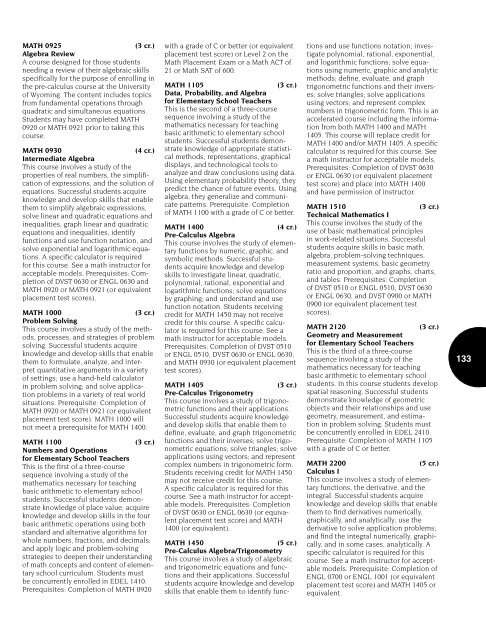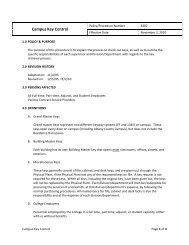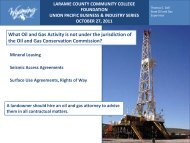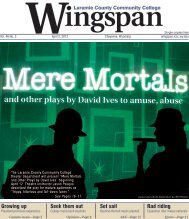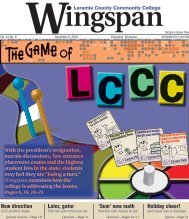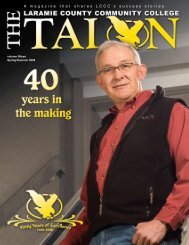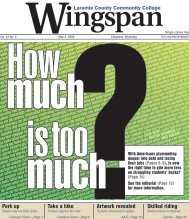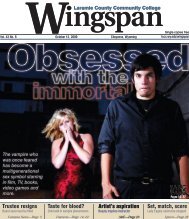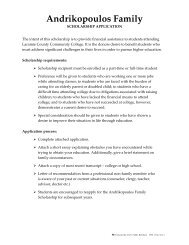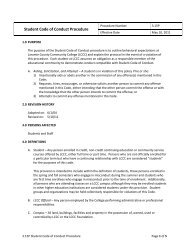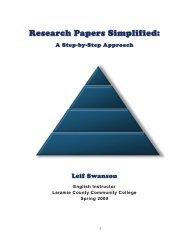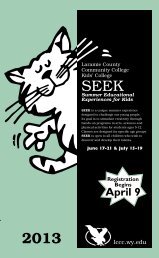LCCC policy - Laramie County Community College
LCCC policy - Laramie County Community College
LCCC policy - Laramie County Community College
You also want an ePaper? Increase the reach of your titles
YUMPU automatically turns print PDFs into web optimized ePapers that Google loves.
MATH 0925<br />
(3 cr.)<br />
Algebra Review<br />
A course designed for those students<br />
needing a review of their algebraic skills<br />
specifically for the purpose of enrolling in<br />
the pre-calculus course at the University<br />
of Wyoming. The content includes topics<br />
from fundamental operations through<br />
quadratic and simultaneous equations.<br />
Students may have completed MATH<br />
0920 or MATH 0921 prior to taking this<br />
course.<br />
MATH 0930<br />
(4 cr.)<br />
Intermediate Algebra<br />
This course involves a study of the<br />
properties of real numbers, the simplification<br />
of expressions, and the solution of<br />
equations. Successful students acquire<br />
knowledge and develop skills that enable<br />
them to simplify algebraic expressions,<br />
solve linear and quadratic equations and<br />
inequalities, graph linear and quadratic<br />
equations and inequalities, identify<br />
functions and use function notation, and<br />
solve exponential and logarithmic equations.<br />
A specific calculator is required<br />
for this course. See a math instructor for<br />
acceptable models. Prerequisites: Completion<br />
of DVST 0630 or ENGL 0630 and<br />
MATH 0920 or MATH 0921 (or equivalent<br />
placement test scores).<br />
MATH 1000<br />
(3 cr.)<br />
Problem Solving<br />
This course involves a study of the methods,<br />
processes, and strategies of problem<br />
solving. Successful students acquire<br />
knowledge and develop skills that enable<br />
them to formulate, analyze, and interpret<br />
quantitative arguments in a variety<br />
of settings; use a hand-held calculator<br />
in problem solving; and solve application<br />
problems in a variety of real world<br />
situations. Prerequisite: Completion of<br />
MATH 0920 or MATH 0921 (or equivalent<br />
placement test score). MATH 1000 will<br />
not meet a prerequisite for MATH 1400.<br />
MATH 1100<br />
(3 cr.)<br />
Numbers and Operations<br />
for Elementary School Teachers<br />
This is the first of a three-course<br />
sequence involving a study of the<br />
mathematics necessary for teaching<br />
basic arithmetic to elementary school<br />
students. Successful students demonstrate<br />
knowledge of place value; acquire<br />
knowledge and develop skills in the four<br />
basic arithmetic operations using both<br />
standard and alternative algorithms for<br />
whole numbers, fractions, and decimals;<br />
and apply logic and problem-solving<br />
strategies to deepen their understanding<br />
of math concepts and content of elementary<br />
school curriculum. Students must<br />
be concurrently enrolled in EDEL 1410.<br />
Prerequisites: Completion of MATH 0920<br />
with a grade of C or better (or equivalent<br />
placement test score) or Level 2 on the<br />
Math Placement Exam or a Math ACT of<br />
21 or Math SAT of 600.<br />
MATH 1105<br />
(3 cr.)<br />
Data, Probability, and Algebra<br />
for Elementary School Teachers<br />
This is the second of a three-course<br />
sequence involving a study of the<br />
mathematics necessary for teaching<br />
basic arithmetic to elementary school<br />
students. Successful students demonstrate<br />
knowledge of appropriate statistical<br />
methods, representations, graphical<br />
displays, and technological tools to<br />
analyze and draw conclusions using data.<br />
Using elementary probability theory, they<br />
predict the chance of future events. Using<br />
algebra, they generalize and communicate<br />
patterns. Prerequisite: Completion<br />
of MATH 1100 with a grade of C or better.<br />
MATH 1400<br />
(4 cr.)<br />
Pre-Calculus Algebra<br />
This course involves the study of elementary<br />
functions by numeric, graphic, and<br />
symbolic methods. Successful students<br />
acquire knowledge and develop<br />
skills to investigate linear, quadratic,<br />
polynomial, rational, exponential and<br />
logarithmic functions; solve equations<br />
by graphing; and understand and use<br />
function notation. Students receiving<br />
credit for MATH 1450 may not receive<br />
credit for this course. A specific calculator<br />
is required for this course. See a<br />
math instructor for acceptable models.<br />
Prerequisites: Completion of DVST 0510<br />
or ENGL 0510, DVST 0630 or ENGL 0630,<br />
and MATH 0930 (or equivalent placement<br />
test scores).<br />
MATH 1405<br />
(3 cr.)<br />
Pre-Calculus Trigonometry<br />
This course involves a study of trigonometric<br />
functions and their applications.<br />
Successful students acquire knowledge<br />
and develop skills that enable them to<br />
define, evaluate, and graph trigonometric<br />
functions and their inverses; solve trigonometric<br />
equations; solve triangles; solve<br />
applications using vectors; and represent<br />
complex numbers in trigonometric form.<br />
Students receiving credit for MATH 1450<br />
may not receive credit for this course.<br />
A specific calculator is required for this<br />
course. See a math instructor for acceptable<br />
models. Prerequisites: Completion<br />
of DVST 0630 or ENGL 0630 (or equivalent<br />
placement test score) and MATH<br />
1400 (or equivalent).<br />
MATH 1450<br />
(5 cr.)<br />
Pre-Calculus Algebra/Trigonometry<br />
This course involves a study of algebraic<br />
and trigonometric equations and functions<br />
and their applications. Successful<br />
students acquire knowledge and develop<br />
skills that enable them to identify functions<br />
and use functions notation; investigate<br />
polynomial, rational, exponential,<br />
and logarithmic functions; solve equations<br />
using numeric, graphic and analytic<br />
methods; define, evaluate, and graph<br />
trigonometric functions and their inverses;<br />
solve triangles; solve applications<br />
using vectors; and represent complex<br />
numbers in trigonometric form. This is an<br />
accelerated course including the information<br />
from both MATH 1400 and MATH<br />
1405. This course will replace credit for<br />
MATH 1400 and/or MATH 1405. A specific<br />
calculator is required for this course. See<br />
a math instructor for acceptable models.<br />
Prerequisites: Completion of DVST 0630<br />
or ENGL 0630 (or equivalent placement<br />
test score) and place into MATH 1400<br />
and have permission of instructor.<br />
MATH 1510<br />
(3 cr.)<br />
Technical Mathematics I<br />
This course involves the study of the<br />
use of basic mathematical principles<br />
in work-related situations. Successful<br />
students acquire skills in basic math,<br />
algebra, problem-solving techniques,<br />
measurement systems, basic geometry<br />
ratio and proportion, and graphs, charts,<br />
and tables. Prerequisites: Completion<br />
of DVST 0510 or ENGL 0510, DVST 0630<br />
or ENGL 0630, and DVST 0900 or MATH<br />
0900 (or equivalent placement test<br />
scores).<br />
MATH 2120<br />
(3 cr.)<br />
Geometry and Measurement<br />
for Elementary School Teachers<br />
This is the third of a three-course<br />
sequence involving a study of the<br />
mathematics necessary for teaching<br />
basic arithmetic to elementary school<br />
students. In this course students develop<br />
spatial reasoning. Successful students<br />
demonstrate knowledge of geometric<br />
objects and their relationships and use<br />
geometry, measurement, and estimation<br />
in problem solving. Students must<br />
be concurrently enrolled in EDEL 2410.<br />
Prerequisite: Completion of MATH 1105<br />
with a grade of C or better.<br />
MATH 2200<br />
(5 cr.)<br />
Calculus I<br />
This course involves a study of elementary<br />
functions, the derivative, and the<br />
integral. Successful students acquire<br />
knowledge and develop skills that enable<br />
them to find derivatives numerically,<br />
graphically, and analytically; use the<br />
derivative to solve application problems;<br />
and find the integral numerically, graphically,<br />
and in some cases, analytically. A<br />
specific calculator is required for this<br />
course. See a math instructor for acceptable<br />
models. Prerequisite: Completion of<br />
ENGL 0700 or ENGL 1001 (or equivalent<br />
placement test score) and MATH 1405 or<br />
equivalent.<br />
133


